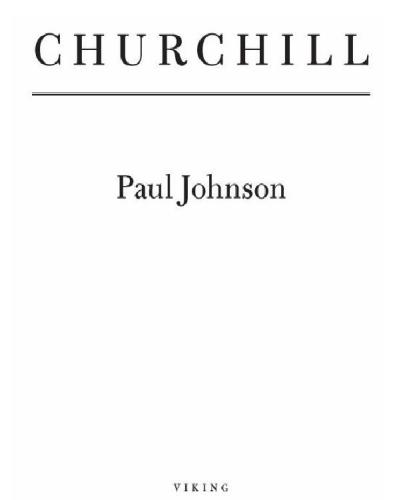
Churchill
کتاب های مرتبط
- اطلاعات
- نقد و بررسی
- دیدگاه کاربران
نقد و بررسی

Starred review from August 24, 2009
In this enthusiastic yet first-rate biography, veteran British historian Johnson (Modern Times
) asserts that Winston Churchill (1874–1965) was the 20th century's most valuable figure: “No man did more to preserve freedom and democracy....” An ambitious, world-traveling soldier and bestselling author, Churchill was already famous on entering Parliament in 1899 and within a decade was working with Lloyd George to pass the great reforms of 1908–1911. As First Lord of the Admiralty, he performed brilliantly in preparing the navy for WWI, but blame—undeserved according to Johnson—for the catastrophic 1915 Dardanelles invasion drove him from office. Within two years, he was back at the top, where he remained until the Depression. Johnson delivers an adulatory account of Churchill's prescient denunciations of Hitler and heroics during the early days of WWII, and views later missteps less critically than other historians. He concludes that Churchill was a thoroughly likable great man with many irritating flaws but no nasty ones: he lacked malice, avoided grudges, vendettas and blame shifting, and quickly replaced enmity with friendship. Biographers in love with their subjects usually produce mediocre history, but Johnson, always self-assured as well as scholarly, has written another highly opinionated, entertaining work. B&w photos.

August 15, 2009
A slender volume on that most unslender of subjects, Winston Churchill.
Memoirist, historian, journalist, soldier, traveler and leader, Churchill committed millions of words to print and generated millions more by other hands. Indeed, writes prolific historian Johnson (Heroes: From Alexander the Great and Julius Caesar to Churchill and de Gaulle, 2007, etc.),"I calculate his total of words in print, including published speeches, to be between 8 and 10 million words." So slim a treatment of the portly prose master would seem unusual, but Johnson seemingly has a purpose in mind—to use Churchill's life as a kind of self-improvement scheme for the rest of us, who have not the opportunity to go steaming off to Gallipoli or escape from the Boers. The author measures Churchill's successes on a broad beam—whence his observation that while Churchill drank like a sailor on shore leave for most of his life,"his liver, inspected after his death, was found to be as perfect as a young child's." Johnson approvingly notes Churchill's habit of casting about widely for learned opinion but keeping his own counsel, making difficult decisions and accepting responsibility for failures as well as successes. Johnson presents a fully rounded character who used the F-word from time to time, though never to Nixonian excess, who learned as he went and who managed to retain principle while acting as a practical politician. The author closes with a list of ten big lessons that Churchill can teach, some very specific (use airpower whenever possible) and some more applicable to ordinary lives (work hard, forge alliances, get your priorities straight).
Personal reflections meet large-scale history, most satisfyingly.
(COPYRIGHT (2009) KIRKUS REVIEWS/NIELSEN BUSINESS MEDIA, INC. ALL RIGHTS RESERVED.)

October 1, 2009
Churchill remains one of the most admired, compelling, yet enigmatic historical figures of the last century. Acclaimed historian Johnson has written a compact biography concentrating more on his subjects personality quirks and contradictions rather than the minutia of his long life. Yet, as Johnson makes clear, those personality quirks offer the best explanations for many of his decisions and actions at critical moments. Churchill adored his parents, but at a distance, since neither of them were very attentive during his childhood. His deep attachment to his nanny left him with great sympathy for lower social classes. Churchills political and social attitudes were products of the Victorian age, yet this apparent arch imperialist showed remarkable sympathy for the resentments of the ruled toward their rulers. His romantic nature and experiences in India and Africa led him to write about the nobility of the warrior, but he dreaded the mass mechanized slaughter that he witnessed on the western front. He was a nineteenth-century man who understood earlier than most that totalitarianism would be the scourge of the twentieth century. Short but incisive.(Reprinted with permission of Booklist, copyright 2009, American Library Association.)

























دیدگاه کاربران